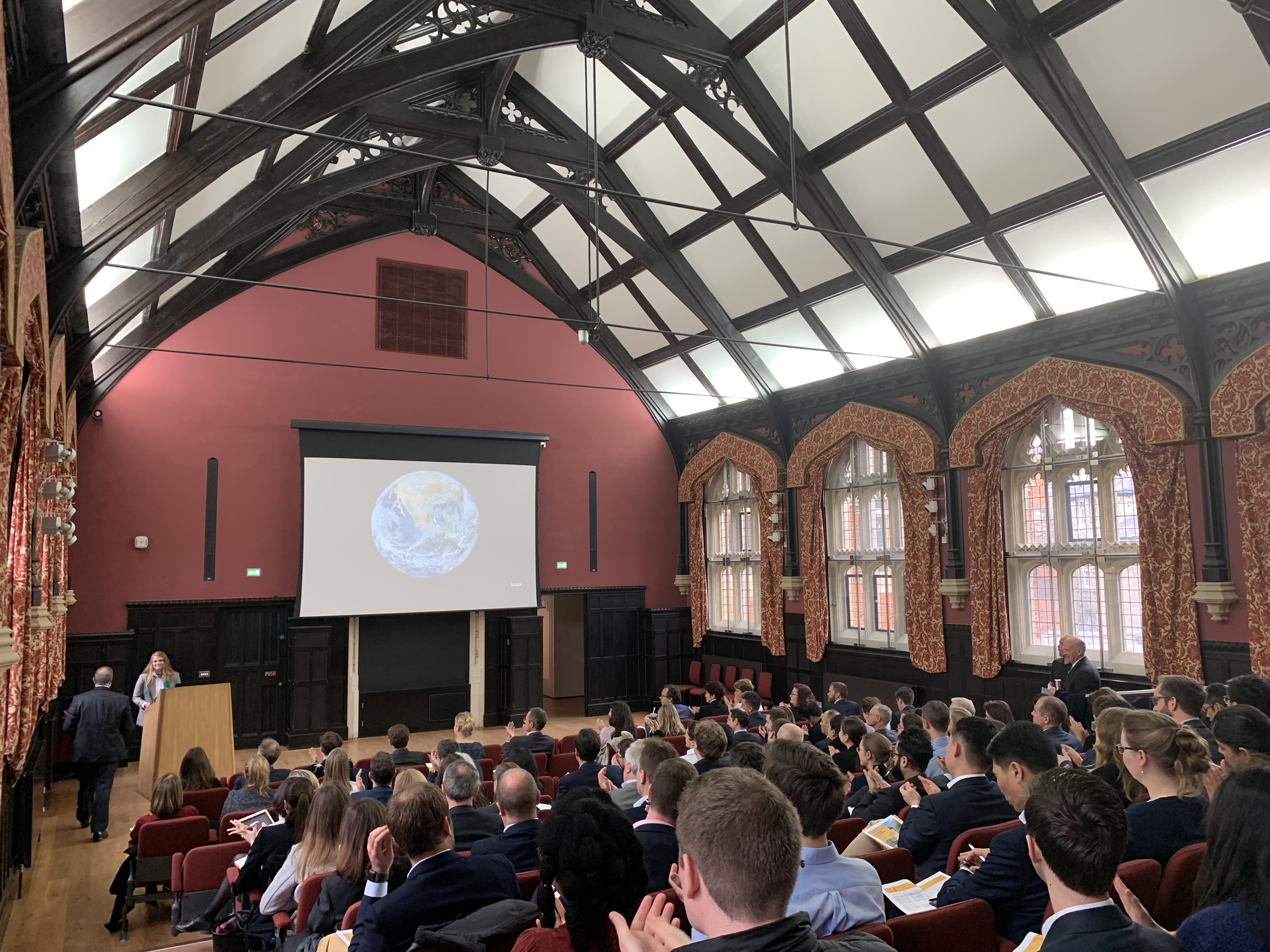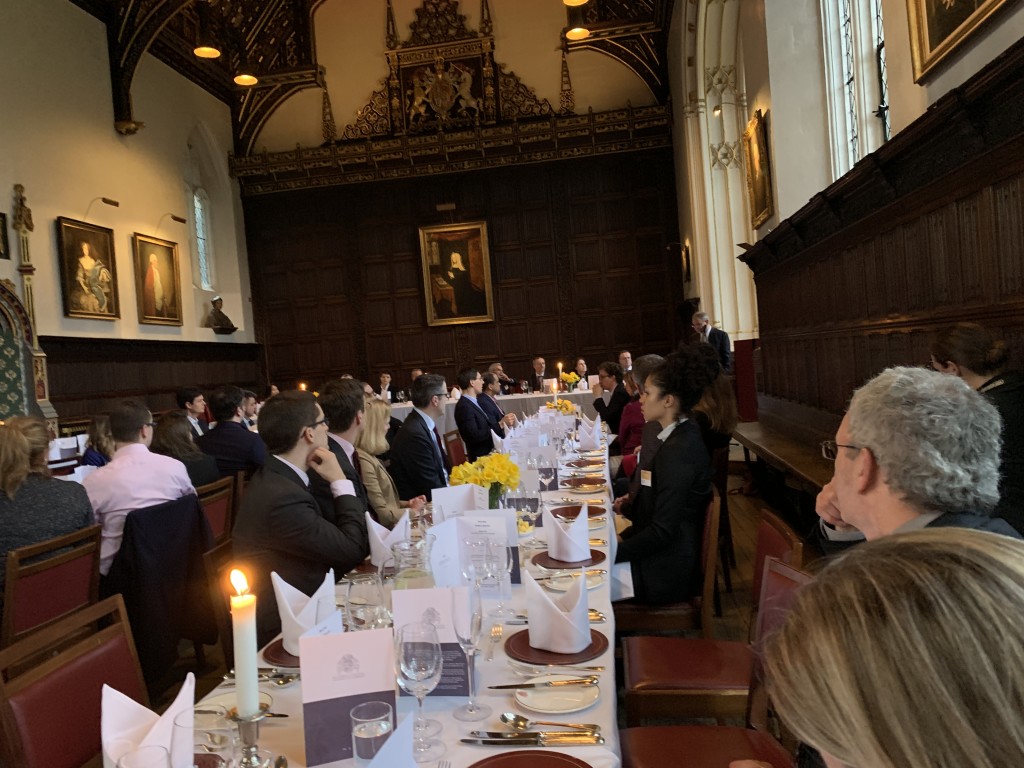University of Cambridge: A Window Into The Future of Sustainable Commerce
Some recent news from the insurance industry reminded me of a lecture that I gave this year in England at the University of Cambridge to some of the world’s largest businesses: businesses interested in transitioning to a more sustainable future. Their comments after my talk, and especially that night over a memorable dinner in a memorable place led me to sense that these executives and their colleagues are keenly aware that our world is changing and that our future will be one fueled by sustainable energy, not fossil fuels. As the year ends, it’s as good a time as any to set politics aside and consider what real people are doing in real businesses to lay a foundation for our sustainable future.
Liberty Mutual, for example, is one of America’s best known insurance businesses and their announcements this month that they have implemented new positions on both coal industry underwriting and investing, as well as having created their first ever Chief Sustainability Officer, got my attention and were in line with what I heard from many of the executives I visited with in England.
”We are committed to being a responsible global corporate citizen with a focus on environmental sustainability, supporting the transition to a low-carbon economy and investing in companies that show proven progress in this evolution. We understand the shift from coal to clean energy is a journey, and we recognize the role the insurance industry plays in supporting that evolution for our customers. Now more than ever, it’s crucial that companies take an active role in advancing their ESG agendas, and I look forward to partnering with internal and external stakeholders around the world to help drive positive impact in society.”
Frances Hyatt, Chief Sustainability Officer
Liberty Mutual Insurance Company
Ms. Hyatt’s new role is to focus on Environmental, Social and Governance (ESG) issues in a world where consumers increasingly demand that those they do business with have a social conscious that includes not supporting fossil fuels such as coal.
Their new approach to underwriting and their investments means the insurer will no longer accept new risks where 25% or more of a business’ sales come from the extraction or production of energy from thermal coal, nor make new investment in businesses that derive more than 25% of their revenue from thermal coal mining or, for that matter, gain more than 25% of their electrical production from thermal coal. The company says it will fully phase out offering coverage or making investments in their current relationships that exceed the same 25% by 2023.
Liberty Mutual is not alone. There is a growing movement within the insurance industry to divest from insuring or inventing in fossil fuel businesses such as coal mines. Following Liberty’s lead, The Hartford Financial Services Group also announced this month that it will stop underwriting any organizations that draw over 25% of its revenue from coal mining.
“The world needs affordable, accessible energy to support global economic progress and, at the same time, action is needed to mitigate the impact such activity has on our climate. Extreme weather affects people’s lives and businesses – and the risks are getting worse. As an insurer and asset manager we recognize the growing cost of this crisis, and we’re determined to use our resources and influence to address the challenge.”
Christopher Swift, Chairman & CEO
The Hartford
According to the organization Unfriend Coal, Liberty Mutual and The Hartford now join 17 other global insurance and reinsurance companies, each a gigantic corporate titan -including Chubb, Swiss Re and Zurich – in implementing a business strategy to begin shifting away from fossil fuel risks and investments and towards sustainability.
These announcements remind me of my time in England and a keynote lecture that I gave this year at the University of Cambridge in England to open their Global Climate Change and Environmental Risk Financial Reporting Conference at the St. John’s College Judge School of Business. Now, I admit that I don’t know much about finance and accounting (but, then again, who does at age 19?); however, I do know a bit about our global climate crisis and have more than a few opinions on the topic.
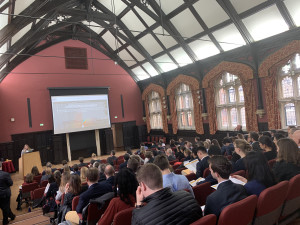 |
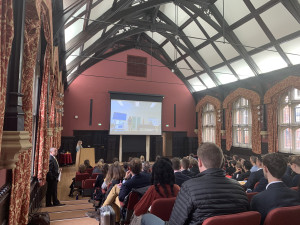 |
The conference at Cambridge was attended by a “who’s who” of global businesses such as banking giant JP Morgan Chase, international insurer Zurich Insurance and hundreds of others. Some in attendance, such as the Nestle Corporation, have made great strides in embracing sustainability while others, such as BP Oil, openly admitted to having a long way to go yet were upbeat in their desire to change and evolve.
My talk that day focused not only only on my own climate journey and concerns but highlighted a handful of businesses that have embraced sustainability and are headed in the right direction along with why I feel that we not only can but must solve our climate crisis.
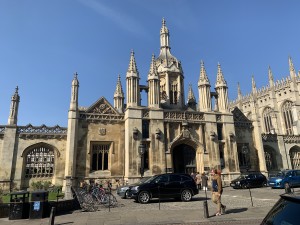 |
 |
 |
After the lecture I was invited to tour the Cambridge campus and later in the day re-joined conference attendees for dinner in the St. John’s College Dinning Hall. I don’t know what J. K. Rowling used as inspiration for the dining hall at Hogwarts in her Harry Potter books, but it would not surprise me if it was St. John’s. Antique and alluring, filled with prodigious paintings, stained glass windows, and voluminous vaulted ceilings St. John’s was most majestic and like the rest of the campus at Cambridge it was a special place indeed.
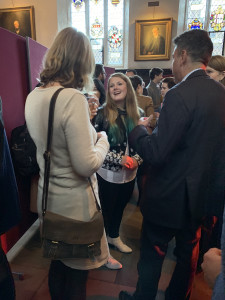 |
 |
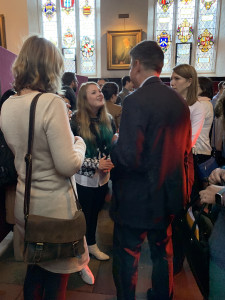 |
 |
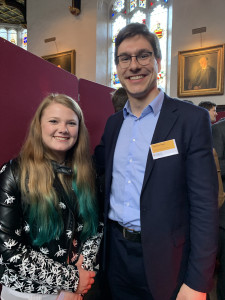 |
 |
But as special as the campus was, the people in attendance were even more impressive. With a day of lectures and work behind them, the conference’s attendees were eager to discuss our climate change crisis with me and to gain the perspective of Generation Z. No sooner than I’d taken my overcoat off and hung it on a heated rack I was bombarded by attendees who wanted to talk about my lecture, what’s happening around the world and share what they are or are not doing to address the issue as good corporate citizens. I spent the next hour or so discussing these topics with four or five adults at a time, all successful people in their fields, and all concerned with whether their businesses were doing enough or fast enough to influence the future.
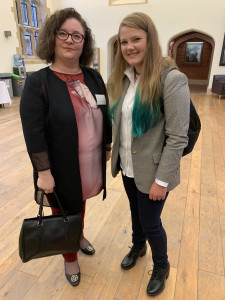 |
 |
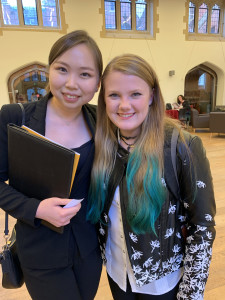 |
And as fascinated as they seemed to be with me, a real life Gen Z kid deeply concerned about climate change, I found their concerns refreshing. Prior to arriving in England I was not certain what to expect from the conference attendees. Would they diminish my concerns as those of a “kid”? Would they put their short term profits ahead of the dire needs of our society? Would they spew the ridiculous political nonsense that we too often hear in the States from one of our two dominant political parties and its leaders?
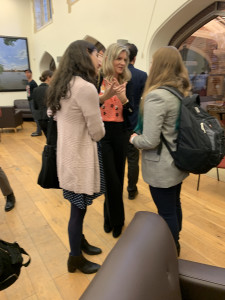 |
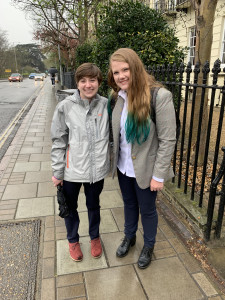 |
 |
Well, I can tell you that none of that happened. Instead they expressed concern for what is happening to our environment. They touted what their businesses were doing to help change things for the better and some commiserated that they feared that their businesses were not doing enough, or fast enough. They were candid, open, engaging and appreciative. Not condescending like so many divisive political leaders here in the U.S. have become. It was, frankly, refreshing.
And speaking of politics, they think what is happening here in the United States is truly tragic. In fact, our political chaos of the past three years was easily the number one thing they wanted to talk about. In Cambridge, beyond the talking heads on television or talking points from one political organization or another that seem to populate our never ending news cycles, these successful businessmen and women from large corporations all over the world wanted to talk to me, a teen at the time, about American politics. And they were very candid with their views and concerns over what the Trump Administration is doing. They made it very clear that they feel we have a brewing global crisis and that the curent administration in the United States is much further behind the rest of the world when it comes to tackling our most serious environmental issues.
While enjoying a delicious four course dinner that night at Hogwarts, I mean St. John’s, I was fortunate to sit with four Australian insurance executives. These ladies once again illustrated why I feel that their industry is going to play a signficant role in forging the change we need to solve our climate change crisis.
These ladies agreed that their industry would be at the forefront of demanding change but as experienced as they are with the data and science, they were shocked when I played videos of the flooding that we are routinely experiencing here in South Florida.
Sure, they had read the predictions and heard about the flooding and rising sea levels, but they had never seen it with their own eyes until I played a video I had filmed of the flooding the prior October (which you can watch here). Of course they knew about the coral bleaching that has been destroying their own Ningaloo and Great Barrier Reefs, but to see damage on the other side of the world that threats their own industry came as a shock to them.
And before I end this post, allow me also share that not only did the business people at that conference leave a positive impression on me but the lovely people I met did too. While being a tourist in and around London and Cambridge there were (literally) signs everywhere you looked about all sorts of environmental topics, concerns and movements. It was refreshing. Whether their trash cans adorning “For Fish’s Sake” campaign signs or posters for climate related events, it’s clear that our friends in Great Britan care a great deal about our environment.
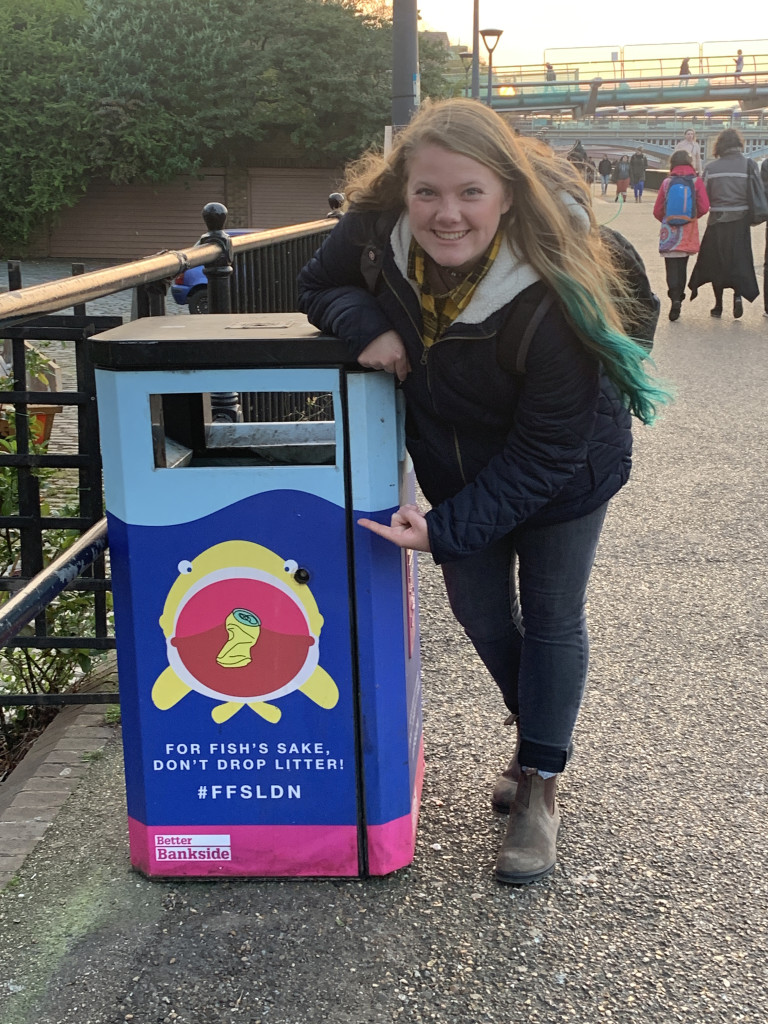 |
 |
As 2019 and the decade of the 2010’s comes to an end I believe that local and global businesses are finally and increasingly beginning to take our climate crisis more seriously. From my view at the front lines of the climate fight over the past six years, it seems to me that the decade which is about to end has been relatively successful, not so much in solving our climate crisis, but in bringing wide-spread awareness about it to every corner of the globe.
And as a new decade dawns, it’s my hope that our civilization will now transition to implementing sustainable solutions rather than spending more time debating what man has so obviously has done to ourselves and our planet over the past century. That was my take away from Cambridge: that change and solutions are taking root all over the world and that serious business people, not pretend politicians, understand what is at stake and seem interested in being part of the solution.
Here’s to hoping that all of us will make the 2020’s the decade of climate solutions. Happy, Healthy New Year.
Allow me to end by thanking Dr. Alan Jagolinzer, professor at the Judge School of Business, for inviting me to speak, as well as he, the University of Cambridge and Dr. Hui Chen, professor at the University of Zurich, for sponsoring my trip. It was an honor to be with you and your colleagues.
